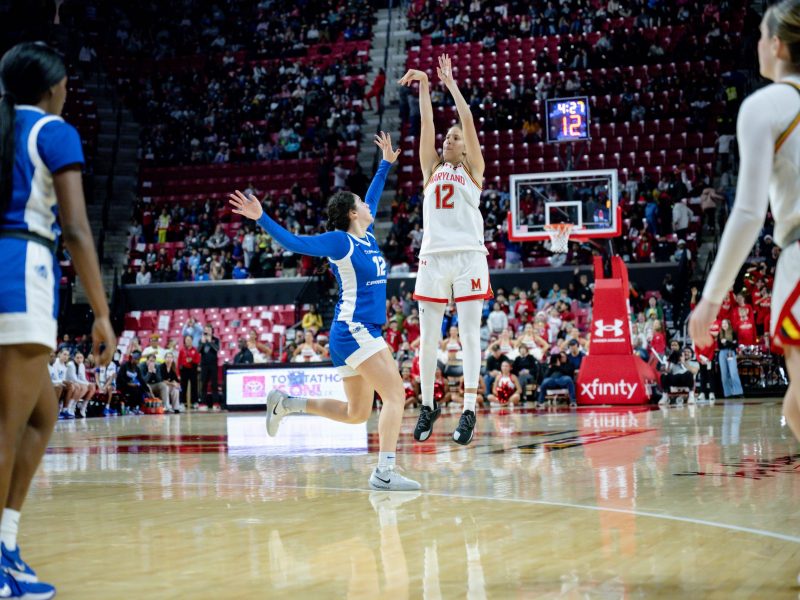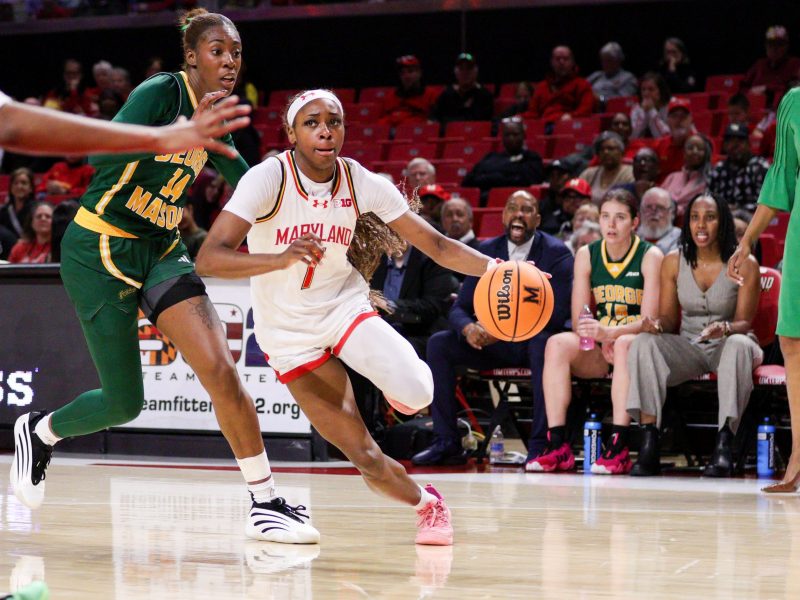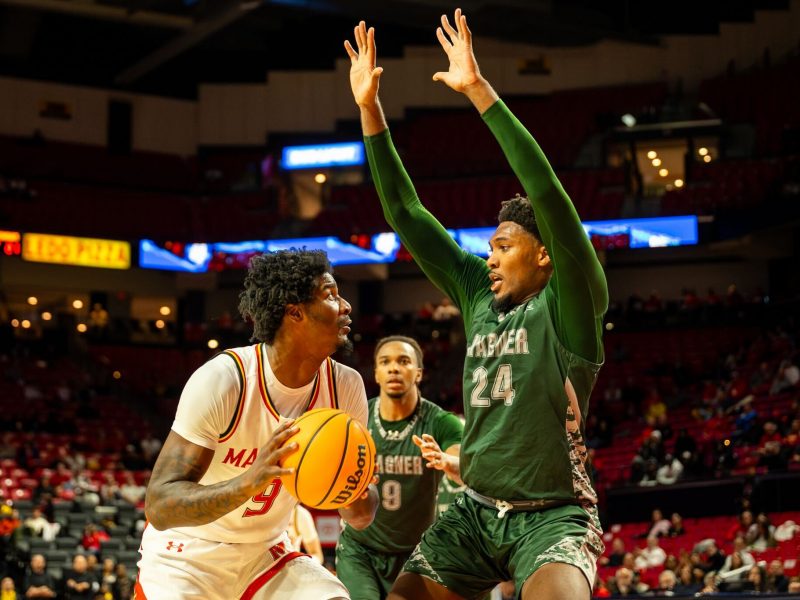Frustration mounted for Julian Reese. Maryland men’s basketball fell to Michigan by 35 points on New Year’s Day in its largest-ever Big Ten loss — Reese played just 16 minutes before fouling out, scoring only two points.
He injured his shoulder a few weeks earlier in a loss to UCLA on Dec. 14, which caused him to miss a game before coming off the bench and scoring seven points against UMBC on Dec. 29. Reese averaged about 6.8 points per game in December before his short and underwhelming outing against the Wolverines.
His confidence dwindled as a result.
But as he did when he chose not to leave Maryland after a tumultuous freshman year, Reese stayed the course through his midseason struggles. He battled through the slump and injury to become a key piece for Maryland and an All-Big Ten honorable mention, averaging 11.4 points and 7.2 rebounds per game.
Then-assistant coach Grant Billmeier prioritized rejuvenating Reese’s confidence and instilling a relentless motor as last season progressed. Billmeier, who Reese often watched film with, showed the forward things he did well earlier in the year and times he needed to step up and be more aggressive during his struggles.
The duo’s film session three days after the loss to Michigan and one day before Maryland’s contest against Rutgers resonated with Reese.
The forward’s stat line against Rutgers was modest, posting eight points and six rebounds, but coach Kevin Willard said it was the best he’d Reese looked “in a long time.” It was more important than a single game, though. Reese started feeling more like himself, playing the way Billmeier desired.
“It looks like he’s back from those 12 days he missed,” Willard said after the Rutgers game, where Reese held opposing All-Big Ten second team center Clifford Omoruyi to a season low four points. “His legs look like they’re there. I thought his pick and roll defense was excellent. I thought he battled all night with [Omoruyi].”
[DeShawn Harris-Smith could define Maryland men’s basketball’s future and its present]
It marked a turning point for Reese — after a few more games with similar numbers, he erupted.
Reese averaged 13.1 points and 7.5 rebounds in the final 17 games of his sophomore season, with some of his best play coming down the stretch in the postseason.
“I feel like it was just a mindset thing,” Reese said. “It had to do with my confidence, a lot to do with my injury against UCLA … when I came back, I was kind of favoring it a little bit. But then, toward the end, I started just being more confident when I just started using it more. And that’s when the numbers improved and I started to produce more.”
Reese gave lots of credit to Billmeier, who left Maryland for a head coaching job at NJIT this offseason. Billmeier called Reese a sponge, and said his desire to learn separates him from the competition.
The two still text — Reese said Billmeier was the first person to reach out to him when he was named to the preseason All-Big Ten team in October, and he reached out to Billmeier ahead of a scrimmage this year.
Billmeier’s departure is the latest of many coaching changes Reese has seen in his career.
It started before he even got to College Park. Former Terps assistant coach Bino Ranson, who recruited Reese and developed a close relationship with him, left for a spot on DePaul’s staff ahead of Reese’s freshman year.
Then, less than a month into the season, coach Mark Turgeon resigned. Danny Manning became the interim head coach and the Terps finished the season with their first losing record since 1991-92. That season, Reese averaged 5.7 points on 45.6 percent shooting. Despite the struggles, he stayed at Maryland when Willard and his staff took over.
[Maryland men’s basketball looks to continue building in Kevin Willard’s second year]
“He could have entertained leaving just like a lot of kids do,” said Reese’s mom, Angel Reese. “But he was like, ‘Mom, I want to stay, I want to see how this works out.’ So I’m most proud that he stayed and just didn’t take the easiest route.”
Reese’s mental toughness was evident. His mom called him “even-keeled,” and Billmeier described him as a “big kid.” Reese said he just needed to attack every day and stick to his guns.
It’s a mentality Willard and the Terps are surely grateful for. Without it, Reese could be wearing a different uniform or stuck in last year’s slump.
Angel Reese said the new coaching staff was unlike any Reese previously had, saying Willard doesn’t “mince his words” and will “drop a couple f-bombs,” though not in a disrespectful manner but rather an encouraging one. Especially after his freshman year, Reese was used to adjusting.
“His willingness to accept us as a new coaching staff was tremendous,” Billmeier said. “He allowed us to coach him and coach him hard … once he got to the level we needed him to be, that’s when the team and the program took off.”
Reese played an integral role in helping Willard establish a foundation in the coach’s first year in College Park, where the Terps outperformed preseason expectations. Reese cited Willard’s resume and the culture he was striving to build as reasons why he stayed at Maryland.
“I feel like he’s trying to make teams [of] guys that just punch guys in the mouth,” Reese said. “[It’s] just a hard-nosed team.”
Reese fits the bill.
His collegiate career didn’t get off to a smooth start, and even in his breakout season, Reese faced mental and physical challenges. But he bought into Willard’s vision for Maryland and Billmeier’s messages about his confidence and motor.
Now, both Reese and Maryland reap the benefits.
“Julian’s gonna kick everyone’s ass and just go at it,” Willard said. “That’s what Julian does, and that’s why I love him.”



